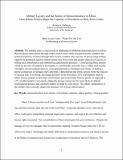Military loyalty and the failure of democratization in Africa : how ethnic armies shape the capacity of presidents to defy term limits
Abstract
The military plays a crucial role in furthering or hindering democratization in Africa. Beyond direct intervention through coups, armies more subtly and perniciously condition the political trajectory of states through their loyalty. Leaders who can rely on unwavering military support for protection against internal unrest face fewer risks and greater chances of success in rolling back liberalization and entrenching authoritarian practices. Constructing ethnic armies, which tie the fate of soldiers to the regime, is a profoundly powerful way to affect such loyalty. Through a mixed methods analysis of presidential bids to challenge term limits, including a paired comparison of Senegal and Cameroon, I demonstrate that ethnic armies triple the chances of success and, in so doing, encourage defiance in the first place: 82% of presidents back by ethnic armies attempt to defy their constitutions and extend their hold on power, as opposed to 31% of other leaders. Conversely, ethnically diverse armies are far more likely to defend constitutional politics and constrain leaders to abide by term limits. The ethnic composition of the military thus critically shapes the prospects for African liberalization.
Citation
Harkness , K A 2017 , ' Military loyalty and the failure of democratization in Africa : how ethnic armies shape the capacity of presidents to defy term limits ' , Democratization , vol. 24 , no. 5 , pp. 801-818 . https://doi.org/10.1080/13510347.2016.1241244
Publication
Democratization
Status
Peer reviewed
ISSN
1351-0347Type
Journal article
Collections
Items in the St Andrews Research Repository are protected by copyright, with all rights reserved, unless otherwise indicated.

